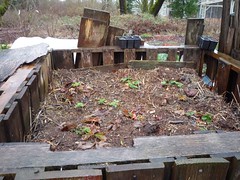| transplanting plants from starter pots to the garden (Photo credit: Wikipedia) |
Plants that are known to take up a great deal of space on the ground when left to their own devices (cucumbers, melons, squash, etc.) may be trained to climb poles that you set up in the garden for them. If space is limited, this is highly recommended. Doing this also provides an opportunity to shade plants that prefer less direct sunlight when planted next to these climbing vines that are climbing vertically. Also make sure you have enough stakes for all the plants that require them for best effect.
Plant your plants so that those needing shade get the shade they need and those that require the most water are located on a downward slope so that they get the water that runs off from the plants that require lesser amounts of water. This is a trick of conservationists and seasoned gardeners that makes the most of sometimes limited resources such as water for the purpose of creating a better environment for optimal growth. At the same time you want to avoid planting vegetables and flowers that require less water at the bottom of these slopes as they are likely to become over hydrated, which can be just as devastating as not getting enough water.
| Compost (Photo credit: nancybeetoo) |
Plan your pest control before you begin planting your garden. There are some plants, flowers, and herbs that work as natural pest controls. These make an excellent addition to your garden as they offer no harmful side effect and can rid your garden of many of the pests that provide constant head aches. Another thing you may wish to consider is the use of chicken wire to protect some of your plants from things a little bigger than the average bug. The more humane the methods of pest control and the less you rely on pesticides the better. (For a few good home-made pest remedies, check out this recent blog post: http://nhlsustainablegardening.blogspot.com/2012/04/four-safe-home-made-pest-remedies-for.html )
And most of all, enjoy getting out in your garden and having a little one-on-one time with nature! It's good for the body and the soul.



No comments:
Post a Comment